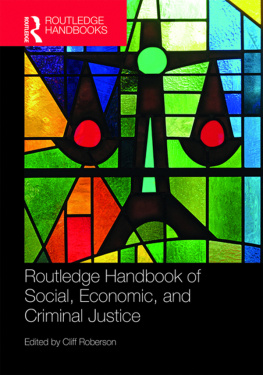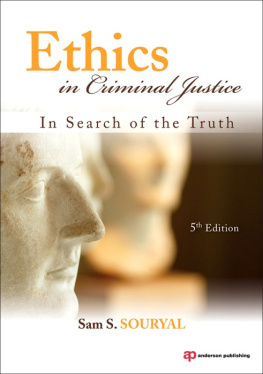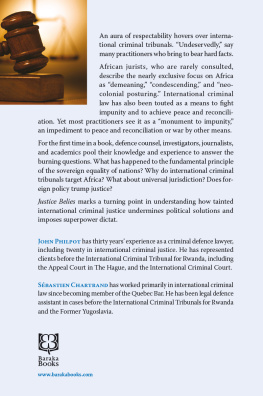The Making of Criminal Justice Policy
This new textbook will provide students of criminology with a better understanding of criminal justice policy and, in doing so, offers a framework for analysing the social, economic and political processes that shape its creation. The book adopts a policy-oriented approach to criminal justice, connecting the study of criminology to the wider study of British government, public administration and politics.
Throughout the book, the focus is on key debates and competing perspectives on how policy decisions are made. Recognising that contemporary criminal justice policy-makers operate in a highly politicised, public arena under the gaze of an ever-increasing variety of groups, organisations and individuals who have a stake in a particular policy issue, the book explores how and why these people seek to influence policy-making. It also recognises that criminal policy differs from other areas of public policy, as policy decisions affect the liberty and freedoms of citizens. Throughout the book, key ideas and debates are linked to wider sociology, criminology and social policy theory.
Key features include:
- a foreword by Tim Newburn, leading criminologist and author of Criminology (2nd edn, 2013);
- a critical and informed analysis of the concepts, ideas and institutional practices that shape criminal justice policy-making;
- an exploration of the relationship between criminal justice and wider social policy;
- a critical analysis of the debate about how and why behaviour becomes defined as requiring a criminal justice solution;
- a range of case studies, critical thinking discussion topics, seminar tasks and recommended further reading to keep the student engaged.
This text is perfect for students taking modules in criminology, criminal justice, and social and public policy, as well as those taking courses on criminal and administrative law.
Sue Hobbs is a Senior Research Officer in the Home Office. She is currently part of a research team investigating criminal justice policy and practice in the 1980s.
Christopher Hamerton is currently Senior Lecturer specialising in Socio-Legal Studies and Criminology at Kingston University, where he leads the MA Cybercrime degree.
How does criminal justice policy get made? More importantly, who has the greatest influence? and how? and why? This book critically explores the making and breaking of criminal justice policy, showing just how political criminal justice policy making can be. In a number of striking case studies the book explores who pulls the strings, who holds the purse, who shouts the loudest and whether this is what really makes the difference. The book is a particularly useful addition to criminal justice studies and criminology, drawing upon the insights of policy studies to explain how laws get made, while comprising plenty of useful activities to develop in the classroom.
Peter Squires, Professor of Criminology & Public Policy, University of Brighton, UK
A fresh, original and highly stimulating approach to the study of criminal justice policy.
Professor Emeritus David Downes, Mannheim Centre, LSE, UK
Many practising and academic criminal lawyers complain frequent ly about the never-ending stream of criminal justice legislation, as they would complain about the weather. The Making of Criminal Justice Policy goes far beyond a critique of the final form and content of legislation. It explains in social, economic and political terms how the policies emerge which ultimately cash out in terms of the legislation that we have. Lawyers, as well as criminologists, should read this book and be educated by it in the fullest sense of that term.
Bob Sullivan, Professor of Criminal Law, University of Sussex; Emeritus Professor of Law, University College, London, UK
Most scholars and researchers accept that the definition and punishment of certain acts as crime is an intrinsically social and political process. Yet there is a dearth of useful accounts or books on how this process unfolds through policy and its effects across the full range of criminal justice institutions. Furthermore, too many students are taught about crime through a fragmented study of offences, theories and methods and then remain bewildered about the criminological big picture.
In filling these gaps, this is a stand-out read among current criminal justice textbooks on the international market. It does not overly simplify its subject matter but with detailed real world examples it gives a lucid account of the complexities of policymaking in contemporary criminal justice.
Professor Stephen Tomsen, Sociology and Criminology, University of Western Sydney, Australia
First published 2014
by Routledge
2 Park Square, Milton Park, Abingdon, Oxon, OX14 4RN
and by Routledge
711 Third Avenue, New York, NY 10017
Routledge is an imprint of the Taylor & Francis Group, an informa business
2014 Sue Hobbs and Christopher Hamerton
The right of Sue Hobbs and Christopher Hamerton to be identified as authors of this work has been asserted by them in accordance with sections 77 and 78 of the Copyright, Designs and Patents Act 1988.
All rights reserved. No part of this book may be reprinted or reproduced or utilised in any form or by any electronic, mechanical, or other means, now known or hereafter invented, including photocopying and recording, or in any information storage or retrieval system, without permission in writing from the publishers.
British Library Cataloguing in Publication Data
A catalogue record for this book is available from the British Library
Library of Congress Cataloging-in-Publication Data
Hobbs, Sue.
The making of criminal justice policy / Sue Hobbs and Christopher
Hamerton.
pages cm.
Includes bibliographical references.
1. Criminal justice, Administration of--Great Britain. 2. Crime
Government policyGreat Britain. I. Hamerton, Christopher. II. Title.
HV9960.G7H63 2014
364.941dc23
2013041325
ISBN: 978-0-415-67695-3 (hbk)
ISBN: 978-0-415-67696-0 (pbk)
ISBN: 978-1-315-79808-0 (ebk)
Typeset in Times New Roman
by RefineCatch Limited, Bungay, Suffolk
Sue Hobbs
Sue Hobbs is currently part of a Home Office-funded research team carrying out an independent investigation into criminal justice policy and practice in the 1980s.
She holds degrees in English Literature and Economic and Social History and Sociology and Social Policy from Manchester Polytechnic and Durham University. She has wide practice experience in the area of criminal justice, and is a former Senior Probation Officer. She worked for eight years as a Senior Lecturer in Community Justice (Probation), delivering teaching on the Home Office-approved degree programme that leads to qualification as a Probation Officer, before joining Kingston University as a Senior Lecturer in Criminology in 2006. She retired from teaching in 2012. She retains an active interest in probation practice and policy development. She recently undertook research for the National Offender Management Service into the transition of young adult offenders from the youth to the adult offending services, and has acted as an academic advisor to Her Majestys Inspectorate of Probation.
Christopher Hamerton







